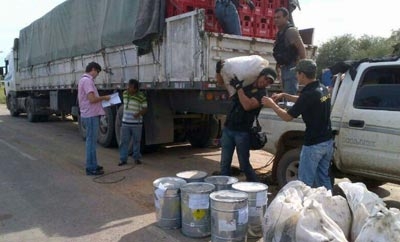Ecuador is developing new technology to track chemicals used in drug production as they move through the country, in a step that could be undermined by the adaptability of drug cartels in finding alternative sources and substitute chemicals.
Rodrigo Velez, the executive director of the National Council for the Control of Narcotic and Psychotropic Substances (Consep) announced the body would be implementing a new monitoring system using GPS tracking chips placed on all vehicles transporting precursor chemicals required for drug production, reported El Telegrafo.
The chip will not only track the route the vehicles take and where the chemicals are handed over but also whether it stops on the way and if the containers are opened.
The equipment for the new system is already in place, and the operation will be launched at the start of next year.
Velez also announced the launch of a new research center to study what chemicals drug traffickers are using to manufacture drugs. Although the preferred precursor chemicals are well known, restrictions on their availability have led to traffickers using alternatives or synthesizing their own versions with more readily available chemicals. The new institute will analyze the end product to try to track evolutions in precursor use.
InSight Crime Analysis
While Ecuador’s efforts to tackle the precursor trade are a welcome move, they are more likely to inconvenience drug traffickers than make a genuine dent in drug production.
One of the main issues in regard to limiting precursor chemicals is the ability of traffickers to avoid more restrictive laws or closer monitoring by simply sourcing precursor chemicals elsewhere. While Velez expressed a desire to implement this new tracking system regionally — especially in key producer countries Peru and Colombia — unless the entire region adopts the new system, there will continue to be ways of getting around controls.
Some countries simply do not have the resources to finance such high-tech solutions. Others, notably Argentina, where the current and previous presidents accepted large political donations from shady characters linked to the trade, have shown a lack of political will to do so.
There is also the issue of substitute chemicals. While Ecuador is intending to take action against this as well, the reality is that such a broad range of possible substitutes exists — many of them common and easily acquired substances, such as cement — that this will be very difficult to control.

